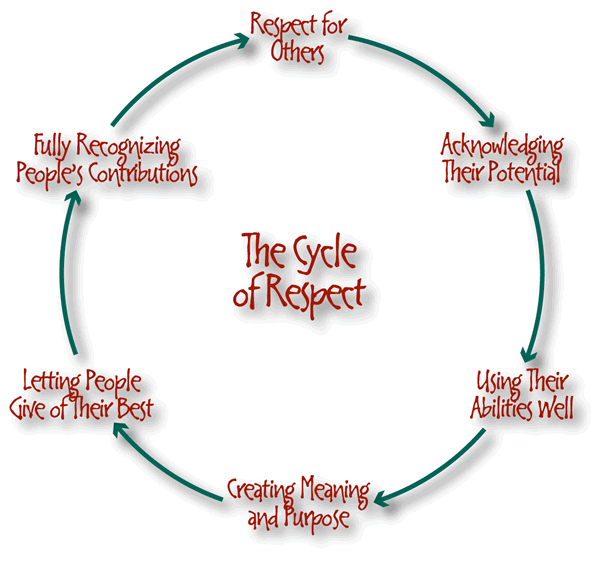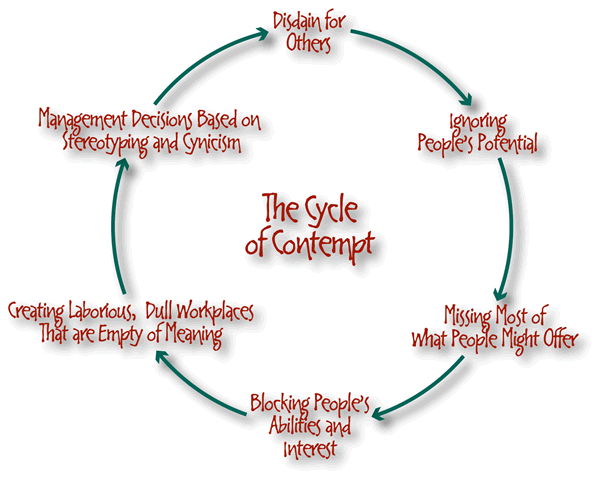Why Respect is Vital for Leaders

I’ve written several posts about trust as one of the foundations of Slow Leadership. Trust, of course, demands respect. I don’t mean simply that people should respect their leaders—as leaders and would-be leaders are often keen to tell us. That’s important, of course, because no one willingly follows a leader whom they don’t respect. But what is far more vital is that leaders should show unfailing respect for all those they deal with, whether as colleagues, subordinates, customers, or merely working contacts.
Like trust, respect for others begins as an assumption—a gift—that other people are worthy of respect, at least until they prove otherwise by their own actions. By respecting people, however humble their position, you also acknowledge their human potential: the in-built ability everyone has to grow, learn, and improve themselves, given the opportunity. And by acknowledging this potential, you naturally come to consider how you can best allow the people to work for you to make best use of whatever talents they have available, and to develop more.
An approach like this creates a feeling of purpose and meaning in the workplace. Whatever the product or service being offered to customers, a major part of the reason people have for coming to work is the way it allows them to use their abilities, and find meaning in life through growing as a person. Wherever there is a sense of meaning, people use that activity to give of their best and show to themselves, as much or more than they show to others, what they can do and what they are worth in the world.
Finally, when those in charge fully respect everyone, it is natural for them to recognize the contributions others make. I don’t mean simply financial recognition (though that is pretty important). I mean that people are noticed and praised for their contributions. I’ve never met a person who truly didn’t want to be noticed or have their work and achievements recognized. Like many people, I volunteer for part of my time. Why do people volunteer? Because they believe in what they are volunteering for, they welcome the opportunity to do something with meaning, and (despite any claims of modesty) they like to be noticed and recognized for what they do. If you want your employees to work with the same enthusiasm as volunteers, try offering them the same trio of “rewards.”
Now compare the Cycle of Respect with its opposite: the Cycle of Contempt, a set of attitudes sadly common in all too many businesses today.
 It begins with an in-built disdain for anyone not as successful, clever, able, or hard working as you think you are. Since this makes successful high-fliers see the remainder of the workforce as inadequate, it’s not surprising they fail even to consider what potential those people might have, or what additional contributions they might offer, given the chance. The result is a self-fulfilling prophecy: other people’s abilities are blocked, therefore they can’t prove themselves, therefore they are “proved” to be limited in capability. Other people are damned as useless without the superior types noticing the reason is more likely to be lack of opportunity than anything else.
It begins with an in-built disdain for anyone not as successful, clever, able, or hard working as you think you are. Since this makes successful high-fliers see the remainder of the workforce as inadequate, it’s not surprising they fail even to consider what potential those people might have, or what additional contributions they might offer, given the chance. The result is a self-fulfilling prophecy: other people’s abilities are blocked, therefore they can’t prove themselves, therefore they are “proved” to be limited in capability. Other people are damned as useless without the superior types noticing the reason is more likely to be lack of opportunity than anything else.With a culture of contempt for underlings, the workplace become a dull, prison-like space where people labor at work they don’t believe in and do only for the money at the end of the week. There is no meaning or sense of purpose. Subordinates know their bosses despise them, so they respond with equal contempt directed at their leaders. It is a case of people blind to the abilities of others leading those who are just as blind to the capabilities of the folk in charge. What a place to work!
This mutual contempt breeds management attitudes and judgments based on cynicism and stereotyping, which then reinforces initial feelings of disdain, creating a feedback loop of contempt, buttressed by visible examples of mutual dislike, pessimism, negativity, and egotistical self-congratulation: “Thank God I am not as that other person down there.”
Despite all the PR-oriented blather about organizations seeing people as their greatest asset—a statement that has become as meaningless and untrue as “we put the customer first”—until leaders commit themselves to the Cycle of Respect, we will continue to find organizations where contempt by those higher up the ladder for everyone else below is the order of the day.







4 Comments:
I quite agree with your comments. Leaders definitely should show unwavering respect for their colleagues, friends, and family.
I work for a nonprofit that helps small and midsize businesses create better work environments. One of the building blocks we were founded on, based on the progressive people practices our founders, the former co-owners of auto parts manufacturer Fel-Pro, Inc., is Trust, Respect & Fairness. Through this foundation and more than 15 years of business and academic research, we have defined this values as follows:
In high-performance workplaces, employees are respected, both as employees and as human beings; there is a fundamental sense of trust between management and staff; and workers are treated fairly and consistently.
We consistently argue that if a progressive, ongoing commitment to Trust, Respect & Fairness is maintained, morale, retention and productivity will be up and turnover will remain down.
Source: http://www.winningworkplaces.org/aboutus/index.php
Thanks for your comment, Mark. It sounds as if you work for a great organization, backed by progressive thinking. Others could learn from your actions.
I quite enjoy your posts, as your thought process of bringing humanity and more of a people focus within management is one of the goals behind my recent blog, The Human Touch (http://the-human-touch.blogspot.com/).
I personally work as as a consultant, and am trying to incorporate some of the concepts of trust, respect, and fairness as a stakeholder relations manager between multiple organizations, which can definitely be a challenge, but is mitigated by ensuring that you view the needs of the individuals in the organizations and use creativity to address them all as much as possible. Thanks again.
Thanks for your comment, Oas. The more people who are out there pursuing the ideals of respect and humanity in all aspects of business, the more likely we are to see real and lasting change. Keep up the good work.
Post a Comment
<< Home